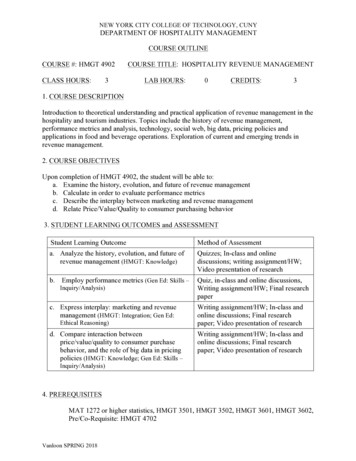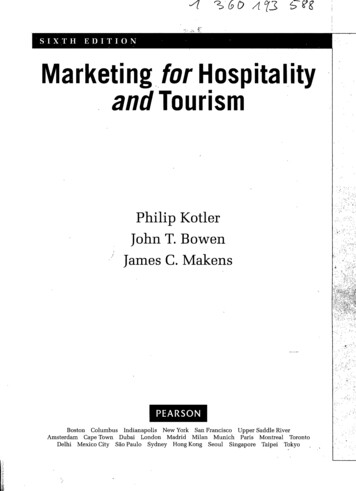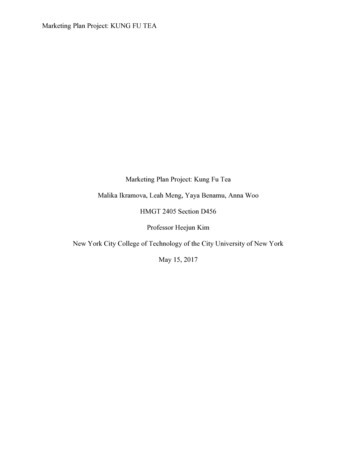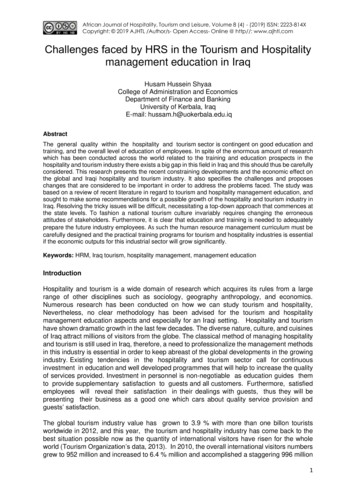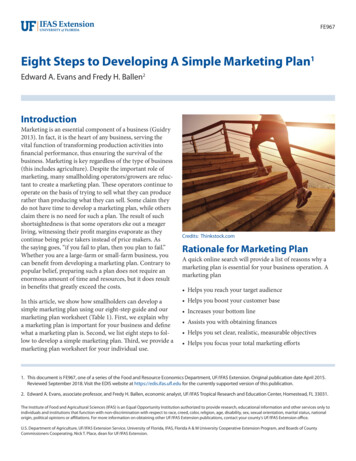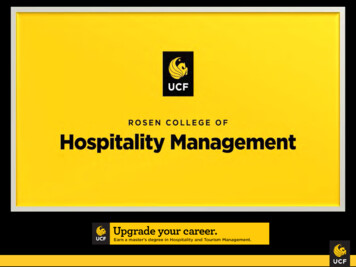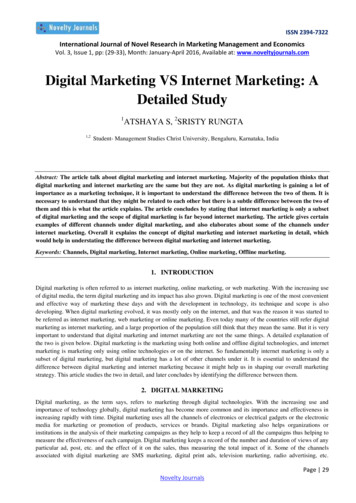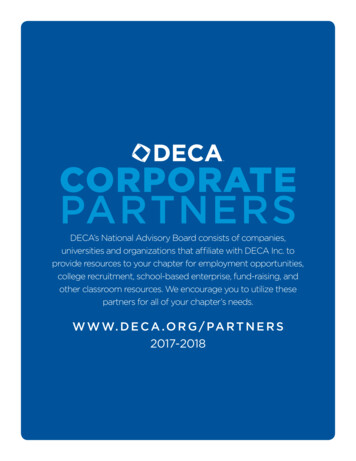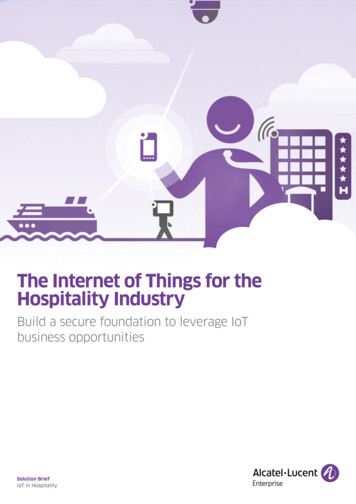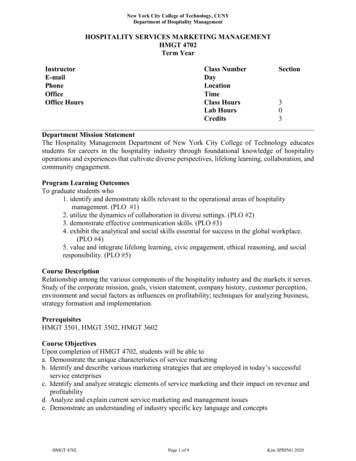
Transcription
New York City College of Technology, CUNYDepartment of Hospitality ManagementHOSPITALITY SERVICES MARKETING MANAGEMENTHMGT 4702Term YearInstructorE-mailPhoneOfficeOffice HoursClass NumberSectionDayLocationTimeClass Hours3Lab Hours0Credits3Department Mission StatementThe Hospitality Management Department of New York City College of Technology educatesstudents for careers in the hospitality industry through foundational knowledge of hospitalityoperations and experiences that cultivate diverse perspectives, lifelong learning, collaboration, andcommunity engagement.Program Learning OutcomesTo graduate students who1. identify and demonstrate skills relevant to the operational areas of hospitalitymanagement. (PLO #1)2. utilize the dynamics of collaboration in diverse settings. (PLO #2)3. demonstrate effective communication skills. (PLO #3)4. exhibit the analytical and social skills essential for success in the global workplace.(PLO #4)5. value and integrate lifelong learning, civic engagement, ethical reasoning, and socialresponsibility. (PLO #5)Course DescriptionRelationship among the various components of the hospitality industry and the markets it serves.Study of the corporate mission, goals, vision statement, company history, customer perception,environment and social factors as influences on profitability; techniques for analyzing business,strategy formation and implementation.PrerequisitesHMGT 3501, HMGT 3502, HMGT 3602Course ObjectivesUpon completion of HMGT 4702, students will be able toa. Demonstrate the unique characteristics of service marketingb. Identify and describe various marketing strategies that are employed in today’s successfulservice enterprisesc. Identify and analyze strategic elements of service marketing and their impact on revenue andprofitabilityd. Analyze and explain current service marketing and management issuese. Demonstrate an understanding of industry specific key language and conceptsHMGT 4702Page 1 of 9Kim SPRING 2020
New York City College of Technology, CUNYDepartment of Hospitality ManagementStudent Learning Outcomesa. Identify and summarize the distinctivecharacteristics of service marketing andmanagement (HMGT: Knowledge; GenEd: Skill)b. Recognize and paraphrase the relationshipbetween the internal workplaceenvironment and customer satisfaction(HMGT: Knowledge; Gen Ed: Integration)c. Identify and exemplify the three physicaldimensions of a service environment(HMGT: Knowledge, Skills; Gen Ed:Integration; PLO #4)d. Compare, contrast, hospitality websiteelements to personal experience (HMGT:Knowledge, Skills; Gen Ed: Integration;PLO #3, #4)e. Define and describe service industrylanguage and concepts (HMGT:Knowledge; Gen ED: Knowledge,Integration)Method of AssessmentParticipation & Professionalism, Case studyand Current Event Analysis, Final examParticipation & Professionalism, Case studyand Current Event Analysis, ServicescapingProject Presentation, Final examServicescaping Project Report,Servicescaping Project PresentationServicescaping Project Report,Servicescaping Project PresentationParticipation & Professionalism, Case studyand Current Event Analysis, Final examGrading ProcedureParticipation & Professionalism (homework, in-class discussion/activities)Case Study & Current Event AnalysisServicescaping ProjectReportPresentationFinal ExamTotal20%20%20%20%20%100%Assignmentsa. Participation & Professionalism Participation: the instructor will monitor students' participation in in-classexercises/discussions. No missed participation exercise will be allowed. Professionalism: this course requires professional and respectful classroom behavior.Students engaging in the following activities (including but not limited to), cell phoneusage, inappropriate posture, reading non-class materials, and chatting/sleeping/eating willbe continuously monitored and such behavior will be reflected in the grade.b. Case Study & Current Event Analysis Read TWO articles WEEKLY on the assigned topics and post them with a comment onTwitter. This assignment is due at the start of a class meeting. No late work will beaccepted.c. Servicescaping Project (the rubrics for written report and oral presentation are on pp. 6-7) Report: Conduct a 'digital' servicescape analysis for a selected local hospitality venue andsummarize the results of the study in APA style.HMGT 4702Page 2 of 9Kim SPRING 2020
New York City College of Technology, CUNYDepartment of Hospitality Management Presentation: Conduct a 'physical' servicescape analysis for the venue and compare onlineservicescapes to offline servicescapes.d. Final Exam A comprehensive essay exam will be given at the end of the semester.Grading SystemA93 – 100A90 – 92.9B 87 – 89.9B83 – 86.9B80 -- 82.9C 77 – 77.9C70 – 76.9D60 – 69.9F59.9 and belowRequired TextNo required textSuggested Texts and ReadingsBitner, M. J. (1992). Servicescapes: The impact of physical surroundings on customers andemployees. Journal of Marketing, 56, 57-71.Kim, H., & Fesenmaier, D. R. (2008). Persuasive design of destination websites: an analysis offirst impression. Journal of Travel Research, 47, 3-13.Lovelock, C., & Wirtz, J. (2017). Essentials of services marketing. 3rd ed. Harlow, Essex:England, Pearson.Pine II, B. J., & Gilmore, J. H. (1998). Welcome to the experience economy. Harvard BusinessSchool Press. Retrieved from conomyYongme, M., & Queich, J. (2018). Starbucks: delivering customer service. Harvard BusinessSchool Press, Retrieved from rse MaterialsN/ARubricsHMGT 4702Page 3 of 9Kim SPRING 2020
New York City College of Technology, CUNYDepartment of Hospitality ManagementHMGT 4702Page 4 of 9Kim SPRING 2020
New York City College of Technology, CUNYDepartment of Hospitality ManagementHMGT 4702Page 5 of 9Kim SPRING 2020
New York City College of Technology, CUNYDepartment of Hospitality ManagementSelected BibliographyConfessore, N., Dance, G. J. X., Harris, R., & Hansen, M. (2018) The follower factory. The NewYork Times. Retrieved /technology/social-media-bots.htmlHall , K. (2019). Stories that stick: How storytelling can captivate customers, influenceaudiences, and transform your business. New York, NY: HarperCollins Leadership.Hopkins, C. D., Grove, S. J., Raymond, M. A., & LaForge, M. C. (2009). Designing the eservicescape: implications for online retailers. Journal of Internet Commerce, 8, 23-43.Hospitality Sales and Marketing Association International (2019). HSMAI-CHDM book. 2nd ed.,Retrieved 10/203889/203889/allarticle.html#Lin, I. Y., & Mattila, A. S. (2010). Restaurant servicescape, service encounter, and perceivedcongruency on customers’ motions and satisfaction. Journal of Hospitality Marketing &Management, 19, 819-841.Lovelock, C., & Wirtz, J. (2017). Services marketing: people, technology, strategy, 8th ed.Derby, England: Pearson.Hwang, J. (2008). Restaurant table management to reduce customer waiting times. Journal ofFoodservice Business Research. 11(4), 334-351.Pulizzi, J. (2013). Epic content marketing: How to tell a different story, break through theclutter, and win more customers by marketing less. New York, NY: McGraw-HillEducation.Scott, D. M. (2017). The new rules of marketing & PR: How to use social media, online video,mobile applications, blogs, news releases & viral marketing to reach buyers directly. 6thed., Hoboken, NJ: Wiley.The Disney Institute., & Kinni, T. (2011). Be our guest: perfecting the art of customer service.New York, NY: Disney Editions.Tuten, T. L., & Solomon, M. R. (2020). Social media marketing. 3rd ed., Thousand Oaks, CA:Sage.HMGT 4702Page 6 of 9Kim SPRING 2020
New York City College of Technology, CUNYDepartment of Hospitality ManagementClass Meeting ScheduleThe following course schedule is tentative and may be subject to change.WeekDateTopics1Introduction to the Course & ProjectsReview the 4Ps & the SWOT AnalysisWhy Study Services?2Service Definition & CharacteristicsConsumer Behavior in the Experience EconomyServices Theater Model3Introduction to ServicescapeThe Bitner’s Servicescape Model4Digital ServicescapesCongruency between Digital and Physical Servicescapes5Delivering Services & Service Blueprint6Website as a Marketing Tool & Effective Website Design7Marketing on Google & Key Measurement Index on the Web8Social Media and Mobile MarketingManaging Online Reviews9Sharing Economy10Customer Relationship Management (CRM)Managing Negative Customer Service Experience11Managing Loyal Customers12Service Leaderships & Future Challenges13Project Presentations – Part I14Project Presentations – Part II15ExamHMGT 4702Page 7 of 9Kim SPRING 2020
New York City College of Technology, CUNYDepartment of Hospitality ManagementStudent AccessibilityQualified students with disabilities, under applicable federal, state, and city laws, seekingreasonable accommodations or academic adjustments must contact the Center for StudentAccessibility for information on City Tech’s policies and procedures to obtain such services.Students with questions on eligibility or the need for temporary disability services should alsocontact the Center at The Center for Student Accessibility:300 Jay Street, room L-237, 718 260 5143. ionalism and ParticipationThe Department of Hospitality Management follows industry standards in order to educate,develop and mentor future hospitality and tourism professionals. In order to successfullycomplete a course, students must consistently participate in class and meet deadlinesNYC College of Technology Statement on Academic IntegrityStudents and all others who work with information, ideas, texts, images, music, inventions, andother intellectual property owe their audience and sources accuracy and honesty in using,crediting, and citing sources. As a community of intellectual and professional workers, theCollege recognizes its responsibility for providing instruction in information literacy andacademic integrity, offering models of good practice, and responding vigilantly andappropriately to infractions of academic integrity. Accordingly, academic dishonesty isprohibited in The City University of New York and at New York City College of Technologyand is punishable by penalties, including failing grades, suspension, and expulsion.As stated in the Academic Integrity Policy Manual,"academic dishonesty occurs when individuals plagiarize or cheat in the course of theiracademic work. Plagiarism is the presenting of someone else’s ideas without propercredit or attribution. Cheating is the unauthorized use or attempted use of material,information, notes, study aids, devices or communication during an academic exercise."The complete text of the College Academic Integrity Policy Manual may be found on theCollege website.Statement of Classroom BehaviorEach student has the right to study and learn in a comfortable, safe, supportive environment thatpromotes self-esteem – free of fear, humiliation, intimidation, offensive or suggestive language.Use of Electronic DevicesThe use of cellular phones and audio equipment in all academic and study areas of the college isprohibited. Students are not permitted to take calls or text message during class. Students maynot use their cell phones as calculators. In some instances, an instructor may allow the use ofpersonal electronic devices for in class activities.Writing Style StatementThe hospitality management department requires that all written work must be prepared usingAPA Style Publication Manual of the American Psychological Association as a reference guide.This includes editorial formats, abbreviations, use of statistics, graphs, citations and references.Visit the City Tech Library website for APA Style Guides.HMGT 4702Page 8 of 9Kim SPRING 2020
New York City College of Technology, CUNYDepartment of Hospitality ManagementHM Department CalendarHMGT 4702Page 9 of 9Kim SPRING 2020
New York City College of Technology, CUNY Department of Hospitality Management . HMGT 4702 Page 1 of 9 Kim SPRING 2020 . HOSPITALITY SERVICES MARKETING MANAGEMENT
